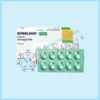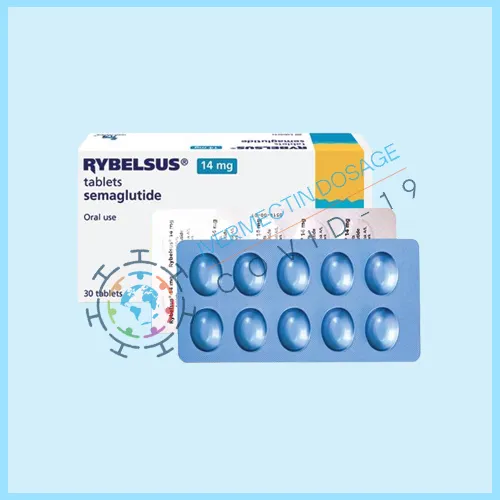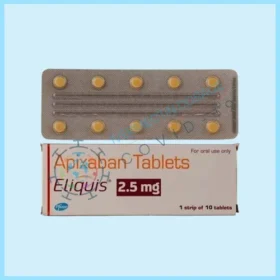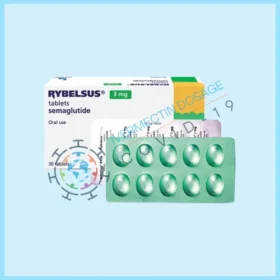- Your cart is empty
- Continue Shopping
Rybelsus 14 mg (Semaglutide)
$350.00 – $1,400.00
Rybelsus 14 mg (Semaglutide) is an oral medication for managing Type 2 diabetes and aiding weight loss. It works by regulating blood sugar levels, reducing appetite, and improving insulin production. Manufactured by Novo Nordisk, it is safe when used as prescribed, with some potential side effects. Always consult a doctor first.
What is Azee 500?
Azee 500 is a prescription antibiotic containing Azithromycin, a macrolide-class antibacterial agent. It is used to treat bacterial infections, including respiratory infections, skin infections, sexually transmitted diseases, and certain gastrointestinal conditions. Azee 500 is a trusted choice among healthcare professionals due to its broad-spectrum activity and effectiveness.
How Does Azee 500 Work?
Azithromycin targets bacterial protein synthesis. By binding to the 50S ribosomal subunit of bacteria, it prevents them from creating essential proteins needed for survival and replication. This bacteriostatic action stops infection spread, allowing the immune system to clear the infection efficiently.
Benefits of Azee 500
- Wide-Spectrum Activity: Effective against various bacteria, including gram-positive, gram-negative, and atypical strains.
- Convenient Dosage: Typically requires only a single dose daily, ensuring better adherence.
- Short Treatment Duration: Most courses last 3–5 days, making it a time-efficient antibiotic.
- Fewer Drug Interactions: Suitable for many patients with fewer contraindications.
- Effective in Respiratory and Skin Infections: Especially beneficial for pneumonia, bronchitis, and cellulitis.
How to Take Azee 500?
- Dosage Guidelines: Follow the prescription provided by your healthcare provider. Commonly, one 500 mg tablet is taken daily.
- Administration: Take it on an empty stomach or 1–2 hours after a meal for optimal absorption.
- Hydration: Swallow the tablet with a glass of water.
- Adherence: Complete the full course, even if symptoms improve early, to prevent resistance.
Who Makes Azee 500?
Azee 500 is manufactured by Cipla Limited, a leading pharmaceutical company headquartered in India. Cipla is renowned for its high-quality, cost-effective medications, distributed globally across markets in the USA, UK, Canada, Australia, Thailand, and Singapore.
Is Azee 500 Safe for Humans?
Azee 500 is generally safe when used as prescribed by a doctor. It is approved for use in various countries, including those regulated by the FDA (USA), MHRA (UK), and TGA (Australia). However, individuals with specific health conditions, such as liver or kidney issues or allergies to macrolides, should consult a doctor before use. Pregnant or breastfeeding women should only take Azee 500 if deemed necessary by a healthcare professional.
Side Effects of Azee 500
Common side effects include:
- Mild: Nausea, diarrhea, stomach cramps, or headache.
- Severe (Rare): Allergic reactions (rash, swelling, breathing difficulty), heart rhythm changes, and liver problems.
Seek medical attention immediately if severe side effects occur.
Disclaimer
This content is for informational purposes only and should not replace professional medical advice. Always consult a healthcare provider before starting or stopping any medication. Adhere to local regulations when purchasing medications and avoid counterfeit or unsafe products from unverified sellers.
Additional Information
| Tablet | 30 Tablets, 60 Tablets, 90 Tablets, 120 Tablets, 150 Tablets |
|---|---|
| Active Ingredient (Generic Name) | Rybelsus |
| Manufacturer | Novo Nordisk |
| Strength | 7 Mg |
| Delivery Time | 6 To 15 days |







Eric Jones –
They were great! And they always offer great attention and care to me as a client.
Kevin Page –
Great customer service quick delivery time couldn’t ask for any better. Thank you.👍
Michael Sandell –
Great price, prompt response from customer service. Very happy & would buy here again!
Steven Robinson –
Quick dispatch after order and arrived in UK in a week.
Excellent service again.
3 orders in the past year and all have been well handled with no hassle.
Packing and condition no problem.